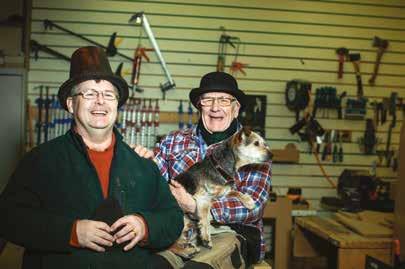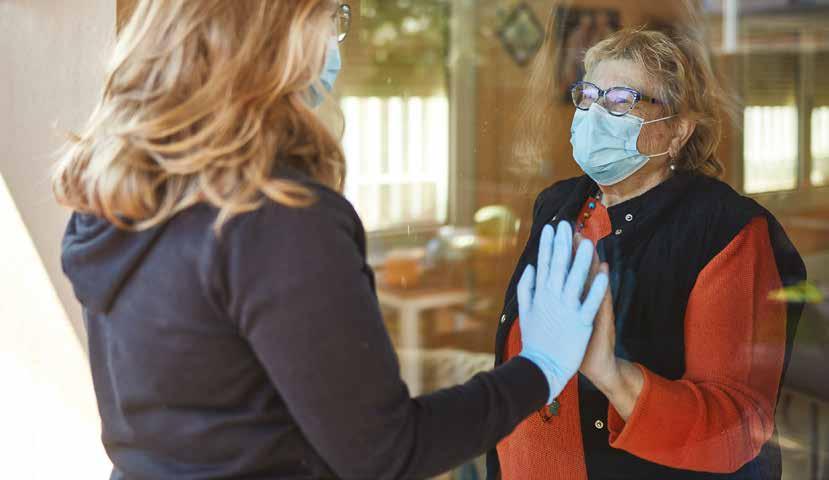
6 minute read
MEN’S SHEDS
MEN’S

Advertisement
Eddy Flynn would take ideas from YouTube, go into his shed and make things. He spent a lot of time alone but never thought of himself as lonely until he came across the Men’s Sheds movement on a forum and became involved. “It made me realise my mental health had been affected by isolation,” he told MC magazine.
SHEDS
Men’s Sheds, a national charity with 300 groups uses the familiar surroundings of a shed to encourage men to come together, create and connect with others. They help reduce loneliness and isolation, but most importantly, they’re fun.

After eight months of volunteering Eddy became coordinator for a new shed project in Bootle’s New Strand shopping centre. “They put me on a social enterprise course which was terrifying! I’d never done anything academic, but dealing with people again boosted my confidence.” Now Eddy motivates others to step over the threshold of Bootle Tool Shed. Volunteers create wooden furniture and crafts to sell.
There’s the usual workshop banter. At lunchtime machines are switched off and the men sit down together for a hearty lunch. As a ship’s engineer, Roger (above, second right) had travelled the world. After retiring and moving to his dream home by the sea, he lacked ‘something to get up for’. Now as a Tool Shed volunteer he’s thriving. “It’s very friendly, we help each other. You listen to other people and stop feeling sorry for yourself.” During lockdown the group has met via Zoom and Skype. There’s always a phone call for those who don’t have smart devices. Work benches are currently being rearranged for social distancing so the Tool Shed can once again welcome its volunteers. Eddy talks of his shed with a wry grin but also affection. “It’s an informal welcoming place. Even the grumpiest among us take pride in helping someone else.”
I’D GIVEN UP
Ted (above with Toby the Tool Shed’s dog), is the shed’s self appointed cook. For some the lunches he prepares may be their only meal. He joined on the advice of his GP following the death of his wife. “At first I thought ‘no way’ but I was in a rut. I came in, put the urn on and made everyone a drink. I’ve never looked back. I’d given up, but now I look forward. I couldn’t be without them. We’re like a family.” Take a peek inside Bootle Toolshed: Visit
Mersey Care social media and search Men’s Sheds Mersey Care
Love fills your heart and it breaks your heart.

ALL YOU NEED IS LOVE

It’s one of the most perplexing, exhilarating and even painful of human experiences. It can harm and it can heal and in the context of the pandemic, it’s grown in importance for many.
Although domestic abuse figures have soared during lockdown, the positive side to this catastrophic story tells of people appreciating family and friends more. Heart warming stories of communities coming together to help and support each other have flooded social media. To put it simply, many are feeling the love.
Strictly Takes Two presenter and Radio 2 host Zoe Ball revealed in an interview with Red Magazine that believing in love has kept her going during testing times – especially after the sudden death of her partner Billy Yates in 2017.
“I believe I was in shock for two years afterwards,” she said. “It’s like you can’t see beyond putting your feet on the floor and getting out of bed each day. Since losing Billy, I’ve met lots of people who’ve helped me have a better understanding of the complexities of mental health. But also, it’s key to remember there is help available for people living with mental health issues and there is hope.
“You find love everywhere. It’s in your friendships and your parents and your children and in music. Love fills your heart and it breaks your heart; it’s so unpredictable, you don’t know where it’s going to come from.
“To feel love is the most incredible feeling in the world. To lose it will nearly end you and take you to your knees, but there’s always more. You know, I look at my kids or my friends and think ‘I couldn’t love you any more.’ And then I do. Love just keeps on coming.” * Research has indicated that love within a satisfying relationship can lead to improved survival rates after coronary bypass surgery. The effects of satisfaction were reported to be just as important to survival as traditional risk factors, such as obesity and tobacco use.
This finding may have been due to happy relationships encouraging healthy behaviour, such as quitting smoking and keeping fit. The pandemic has also rescued romantic love, according to Lawrence R. Samuel writing in Psychology Today. “Much like during and immediately after two previous historically traumatic events – World War II and 9/11– there is now a window of opportunity for romantic love to flourish. In times of crisis, humans, like most other species, tend to gravitate toward each other as a natural instinct of survival.”
Consultant clinical psychologist Sarah Butchard
According to Samuel we are streamlining our priorities and rethinking how to infuse our lives with more meaning and purpose. In place of the endless and ultimately unfulfilling pursuit of things, we’re placing more value on relationships with others. Mersey Care consultant clinical psychologist Sarah Butchard says people are feeling the need to connect in any way possible, other than the physical: “It’s a basic human need to feel connected to people to help us survive.”

Thousands have embraced technology like Zoom to stay in touch with family and friends, while others have felt compelled to spread the love as a volunteer. “Three quarters of a million people volunteered to help the NHS, that was such an overwhelming response an outpouring of connectedness. It would be wonderful to think that society will stay this way after Covid,” says Sarah. “As Zoe says when you lose someone you’re forced to re evaluate and pull together and that is what is happening here.” Our basic instinct is to look after the people we care about. According to Maslow’s Hierarchy of Needs – a motivational theory in psychology comprising a five tier model of human needs, including physiological, safety, love and belonging, esteem, and self actualization – our most basic need is to be secure and safe. “At the moment we can see threats to the people we care about and we want to protect them and that’s generating strong feelings, whether that’s love or protection,” she says. As a clinical psychologist Sarah has experience of service users who have been denied love.
“Adverse clinical events, or anything that happens in childhood, have a massive impact on adult mental health. We see a lot of people in clinical services who have had difficulties in childhood and we use compassion focused therapy, which is specifically designed to help people connect with compassion and kindness to themselves. “If you’ve never had experience of that it’s very hard to accept it from others. That doesn’t mean that if you’ve had a bad childhood that you’re written off for life. With therapy we can help change the way people see themselves and the world.”
REFERENCES
medicalnewstoday.com/articles/233278#1 simplypsychology.org/maslow.htmlRooms @ZoeTheBall
@zoetheball










